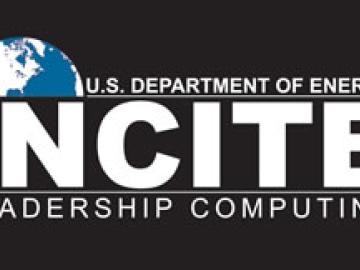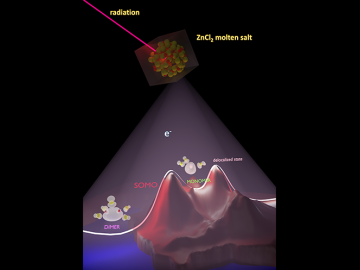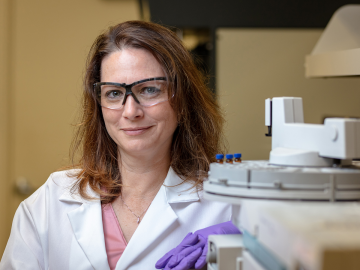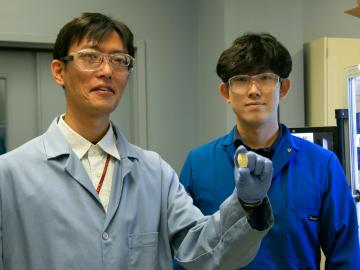Filter News
Area of Research
News Topics
- (-) Exascale Computing (9)
- (-) Molten Salt (2)
- (-) Polymers (12)
- 3-D Printing/Advanced Manufacturing (43)
- Advanced Reactors (10)
- Artificial Intelligence (28)
- Big Data (8)
- Bioenergy (24)
- Biology (22)
- Biomedical (17)
- Biotechnology (7)
- Buildings (12)
- Chemical Sciences (29)
- Clean Water (1)
- Climate Change (22)
- Composites (9)
- Computer Science (57)
- Coronavirus (17)
- Critical Materials (11)
- Cybersecurity (17)
- Decarbonization (17)
- Education (3)
- Element Discovery (1)
- Energy Storage (41)
- Environment (36)
- Fossil Energy (1)
- Frontier (14)
- Fusion (14)
- Grid (15)
- High-Performance Computing (26)
- Isotopes (17)
- ITER (2)
- Machine Learning (13)
- Materials (58)
- Materials Science (50)
- Mercury (2)
- Microscopy (16)
- Nanotechnology (26)
- National Security (17)
- Net Zero (3)
- Neutron Science (49)
- Nuclear Energy (25)
- Partnerships (26)
- Physics (24)
- Quantum Computing (9)
- Quantum Science (26)
- Renewable Energy (1)
- Security (11)
- Simulation (8)
- Space Exploration (3)
- Statistics (2)
- Summit (20)
- Sustainable Energy (31)
- Transformational Challenge Reactor (4)
- Transportation (24)
Media Contacts

Corning uses neutron scattering to study the stability of different types of glass. Recently, researchers for the company have found that understanding the stability of the rings of atoms in glass materials can help predict the performance of glass products.

The Department of Energy’s Office of Science has allocated supercomputer access to a record-breaking 75 computational science projects for 2024 through its Innovative and Novel Computational Impact on Theory and Experiment, or INCITE, program. DOE is awarding 60% of the available time on the leadership-class supercomputers at DOE’s Argonne and Oak Ridge National Laboratories to accelerate discovery and innovation.

In a finding that helps elucidate how molten salts in advanced nuclear reactors might behave, scientists have shown how electrons interacting with the ions of the molten salt can form three states with different properties. Understanding these states can help predict the impact of radiation on the performance of salt-fueled reactors.

Rigoberto Advincula, a renowned scientist at ORNL and professor of Chemical and Biomolecular Engineering at the University of Tennessee, has won the Netzsch North American Thermal Analysis Society Fellows Award for 2023.

Lawrence Livermore National Laboratory’s Lori Diachin will take over as director of the Department of Energy’s Exascale Computing Project on June 1, guiding the successful, multi-institutional high-performance computing effort through its final stages.

ORNL has named Michael Parks director of the Computer Science and Mathematics Division within ORNL’s Computing and Computational Sciences Directorate. His hiring became effective March 13.

Laboratory Director Thomas Zacharia presented five Director’s Awards during Saturday night's annual Awards Night event hosted by UT-Battelle, which manages ORNL for the Department of Energy.

ORNL has been selected to lead an Energy Frontier Research Center, or EFRC, focused on polymer electrolytes for next-generation energy storage devices such as fuel cells and solid-state electric vehicle batteries.

ORNL researchers have developed an upcycling approach that adds value to discarded plastics for reuse in additive manufacturing, or 3D printing.

Doug Kothe has been named associate laboratory director for the Computing and Computational Sciences Directorate at ORNL, effective June 6.




